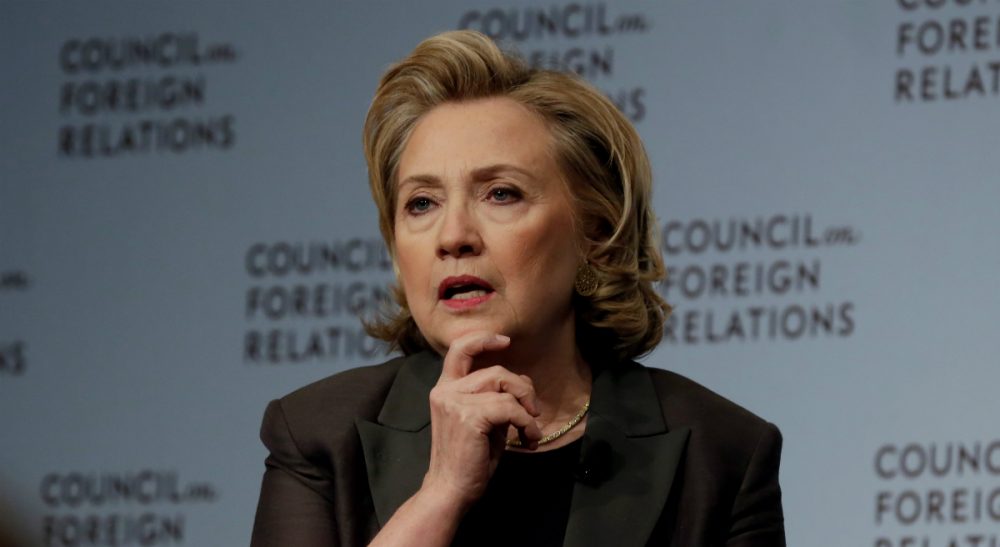Advertisement
Hillary Clinton Is Dead Wrong About Being 'Dead Broke'

It was the one discordant note in an otherwise finely tuned preview of Hillary Clinton’s prospective 2016 presidential bid. Packaged as a book launch, the preliminary rollout of her inevitable campaign dispatched questions about the 2012 Benghazi attack, her 2002 Iraq war vote and her age, with sound byte skills well honed during a long career in the public eye.
The former secretary of state, senator from New York and first lady of the United States stumbled only once this week in interviews promoting her 635-page memoir, “Hard Choices.” She and Bill Clinton were “dead broke” when they left the White House in January, 2001, she whined to Diane Sawyer.
"You have no reason to remember, but we came out of the White House not only dead broke, but in debt," Clinton said. "We had no money when we got there, and we struggled to piece together the resources for mortgages for houses, for Chelsea's education. It was not easy.”
It wasn’t especially hard, either. Feigning poverty, when most people in this country are still scratching their way back from a global financial collapse they had no hand in creating, is definitely bad form. It is even worse politics. It clearly has been a long time since Hillary Clinton has been on the campaign trail.
That the Clintons owed a small fortune to the lawyers who guided them safely through Trooper-gate, Whitewater, Travel-gate and the impeachment debacle is certain. That they would be printing money within a month of George W. Bush’s inauguration is just as undeniable.
[W]e came out of the White House not only dead broke, but in debt...
Hillary Clinton, in an interview with ABC News
A month before leaving the White House, the newly elected U.S. senator from New York signed a deal for $8 million with Simon & Schuster for her memoir, “Living History.” That was the same month the couple bought a seven-bedroom house near Embassy Row in Washington, D.C., for $2.85 million. This was in addition to the $1.7 million house in Chappaqua they had purchased the year before, when she needed to establish residency in New York.
The banks had every reason to be sanguine about the Clintons' ability to repay those mortgages.
Within months of leaving 1600 Pennsylvania Avenue, the former president had signed a book deal of his own, this time with Alfred A. Knopf, for a reported $10 million. His autobiography, “My Life,” became a bestseller. His fee for a single speech hit a high of $250,000 for an appearance in Paris for Citigroup in 2004, the year the Clintons retired all of their legal debts.
It did not take Clinton long to pull back from her absurd characterization of the family’s finances, telling ABC News, “We have a life experience that is clearly different in very dramatic ways from many Americans, but we also have gone through some of the same challenges many people have.” During an appearance in Chicago, she told Mayor Rahm Emanuel, “That may have not been the most artful way of saying that Bill and I have gone through a lot of different phases in our lives. That was then, this is now. Obviously, we are very fortunate.”
Fortunate enough to throw their daughter, Chelsea, a lavish wedding, the cost of which was reported to top $2 million.
Now might be a good time to suggest that political candidates stop trying to identify rhetorically with “hard-working citizens,” and “ordinary Americans,” and “working people,” and with their favorite target audience of all, “the middle class.”
Now might be a good time to suggest that political candidates stop trying to identify rhetorically with 'hard-working citizens,' and 'ordinary Americans,' and 'working people,' and with their favorite target audience of all, 'the middle class.'
According to an analysis by the Center for Responsive Politics of 2012 financial disclosure forms, more than half of the members of Congress had an average net worth of $1 million or more. Many of them are worth much, much more. The American people apparently do not begrudge them their wealth — they voted for them.
Enduring personal financial struggle is not a necessary prerequisite for a political commitment to address the burgeoning income inequality in this country. If it were, Theodore Roosevelt would not have taken on the Trusts, and Franklin Delano Roosevelt would not have brought us the New Deal. But to lead this country does require a finely developed sense of proportion, whether that is about a perceived threat to national security or recognition of true financial hardship.
On her book tour, Secretary Clinton would do well to talk less and to listen more to the life stories of those ordinary Americans lining up to read hers.
Related:

